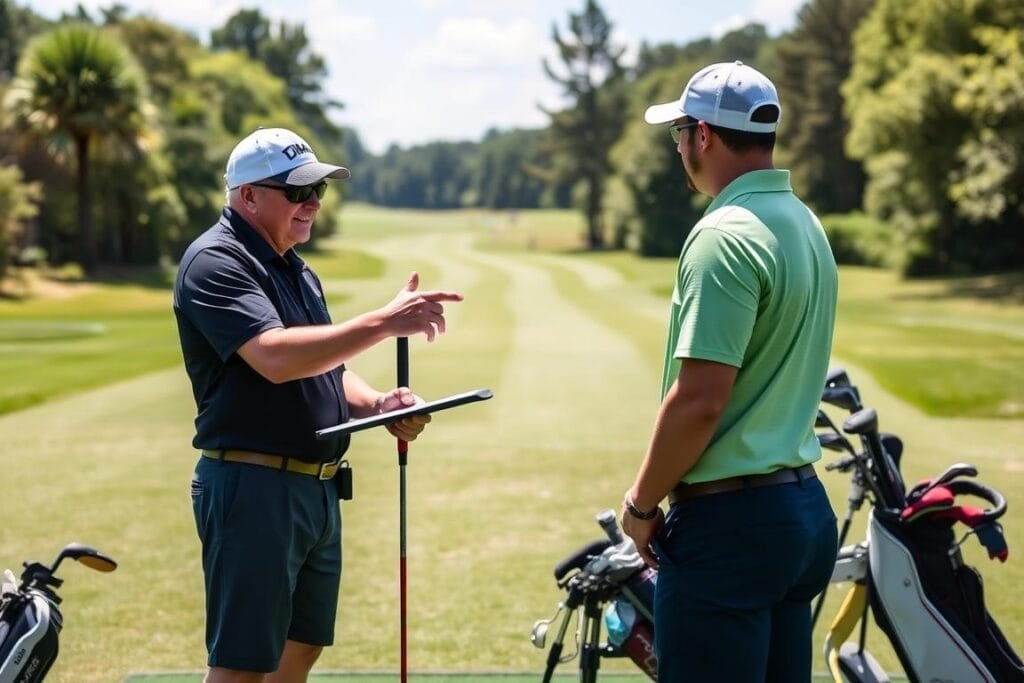Starting your golf journey can be both exciting and overwhelming. Professional golf lessons provide structured guidance that can significantly accelerate your learning curve.
With the help of a qualified coach, you can avoid developing bad habits and improve much faster. Statistics show that beginners who take formal instruction save an average of 7 shots compared to self-taught players.
This comprehensive guide will walk you through everything you need to know about starting your golf journey, from finding the right coach to mastering fundamental techniques.
By understanding the proper approach to learning golf, you can save years of frustration and enjoy the game more quickly.
Understanding the Value of Golf Lessons for Beginners

The right golf lessons can transform a beginner’s game by providing personalized feedback and guidance. During the initial lesson, coaches typically conduct a comprehensive evaluation of your swing using advanced technology like Optimotion to pinpoint strengths and areas that need improvement.
What to Expect from Your First Lesson
In your first golf lesson, expect a thorough assessment of your current golfing abilities. Coaches will analyze your swing mechanics, providing insights into how you can improve your technique.
The Learning Timeline for New Golfers
The journey to becoming proficient in golf varies significantly among individuals. Key milestones include:
- Most beginners require 3-6 months of regular lessons and practice to develop consistent fundamentals.
- Dedicated beginners often see significant improvement within the first 2-3 months.
- Complete beginners should expect to spend at least one year developing their skills before reaching an intermediate level.
- The learning timeline varies based on practice frequency and individual athletic ability.
- Many instructors recommend weekly lessons for the first few months, then spacing them out as consistency improves.
- Reaching an advanced level can take several years of consistent practice and lessons.
Essential Golf Equipment for Newcomers

The journey to becoming a skilled golfer begins with understanding the essential equipment required for the sport. As a beginner, it’s crucial to start with the basics and gradually build your golfing arsenal.
When it comes to golf equipment, the most significant investment is in your golf clubs. As a newcomer, you don’t need to break the bank; a starter set or a beginner golf club set can be an excellent starting point.
Selecting the Right Clubs as a Beginner
Choosing the right golf clubs can be daunting, but focusing on a set that includes a mix of irons, woods, and a putter is a good starting point. Consider visiting a pro shop for guidance on selecting clubs that fit your swing and budget.
Additional Gear You’ll Need
Beyond golf clubs, there are several other pieces of equipment that are essential for a golfing experience:
- A functional bag with adequate storage and comfortable straps is essential for organizing your equipment.
- Invest in a glove for your lead hand (left hand for right-handed players) to improve grip security and prevent blisters.
- Purchase a large supply of inexpensive golf balls as beginners typically lose many during practice and play.
- Weather-appropriate golf attire that meets course dress codes is important—most pro shops can advise on specific requirements.
- Consider a rangefinder or GPS device to help with distance assessment, though these can be added later as your skills develop.
- Don’t forget small accessories like tees, ball markers, divot repair tools, and a towel for your bag.
Finding the Right Golf Instructor

The right golf instructor can provide personalized guidance and help beginners progress faster. A good coach understands the importance of clear communication, breaking down complex swing analyses into understandable parts, and identifying individual strengths and areas for improvement.
Qualities to Look for in a Golf Coach
When searching for a golf coach, look for someone who can offer customized instruction tailored to your learning style. A good coach should be able to communicate effectively and provide constructive feedback that helps you improve your game.
Private vs. Group Lessons: Which is Better for Beginners?
Beginners often debate whether to take private or group lessons. Private lessons offer personalized attention and can help you progress faster initially. Group lessons, on the other hand, provide a supportive social environment and are more affordable. Many coaches recommend starting with private lessons to establish fundamentals, then transitioning to group settings for practice and reinforcement.
Mastering the Fundamentals of Golf
Golf fundamentals are the building blocks upon which a strong game is constructed. For a beginner, grasping these basics is essential to improve their golf game.
To start with, a solid foundation in the basics is crucial. This includes understanding the proper techniques and principles that govern the game.
Proper Grip and Stance Techniques
A correct grip and stance are vital for a consistent and effective golf swing. The grip should be firm but not overly tight, with the hands positioned equally on the club. The stance should be balanced, with feet shoulder-width apart.
Understanding the Basic Swing Mechanics
The golf swing is a complex motion that involves coordination and timing. It begins with a smooth backswing, followed by a controlled downswing, and ends with a balanced follow-through.
Putting Fundamentals for Beginners
Putting is a critical aspect of golf, accounting for approximately 40% of shots. Key elements include a stable lower body, minimal wrist action, and accurate alignment. Practicing short putts can help build confidence.
- A stable lower body and minimal wrist action create consistency in the putting stroke.
- The eyes should be positioned directly over or slightly inside the ball line for accurate alignment.
| Fundamental | Description | Importance |
|---|---|---|
| Grip | Firm but not overly tight, with hands equally positioned on the club | High |
| Stance | Balanced, with feet shoulder-width apart | High |
| Putting Stroke | Stable lower body, minimal wrist action | High |
Effective Practice Strategies for Improvement

The path to golfing excellence begins with a well-structured practice routine. To improve, you need to practice effectively, focusing on the right aspects of your game.
Modern golf training technology has revolutionized the way we practice. GOLFTEC uses OPTIMOTION motion capture technology to pinpoint areas for improvement in your swing.
Structured Practice Routines
A structured practice routine helps you stay focused. It should include a mix of driving range practice, short game work, and putting.
- Allocate specific days for different skills, like driving or putting.
- Set clear goals for each practice session.
- Use tools like launch monitors to measure critical data points.
Using Technology to Track Your Progress
Technology plays a vital role in tracking your progress. Discover how to improve without expensive.
Some key technologies include:
- Video analysis apps to record and compare your swing.
- Performance tracking apps to identify statistical patterns.
- Digital putting analyzers to detect subtle flaws.
Common Mistakes Beginners Should Avoid
Being aware of the common mistakes that beginner golfers make can significantly enhance their learning experience. As a beginner, it’s easy to fall into patterns that can hinder your progress in golf.
Some of the most significant errors occur in the technical aspects of the game.
Technical Errors in Your Swing
Many beginners try to remember too many technical thoughts during their swing instead of focusing on one key element at a time. This can lead to confusion and inconsistency. For instance, trying to perfect your swing mechanics while also worrying about your stance can be overwhelming.
Mental Approach Pitfalls
Unrealistic expectations and comparing your progress to others can create unnecessary pressure. Allowing bad shots to affect your mood or subsequent swings creates a negative cycle that impedes learning. It’s essential to maintain patience and perspective, understanding that time and practice are crucial for mastery.
- Focusing on multiple technical aspects simultaneously can confuse your swing.
- Having unrealistic expectations can lead to discouragement.
- Comparing yourself to others creates undue stress.
Golf Etiquette Every Beginner Should Know
Golf etiquette is a vital aspect of the game that every beginner should be familiar with to ensure a respectful and efficient game. Understanding and practicing good golf etiquette not only enhances your own golfing experience but also contributes to a positive environment for other golfers.
Being aware of your behavior on the course is crucial. This includes respecting other players, taking care of the course, and being mindful of your pace of play.
On-Course Behavior Basics
On-course behavior is a fundamental aspect of golf etiquette. It involves being considerate of other golfers and maintaining the integrity of the course. Key aspects include repairing ball marks on the green, raking bunkers after play, and keeping the course free of litter.
- Be respectful of other golfers by remaining quiet and still during their shots.
- Take care of the course by repairing ball marks and raking bunkers.
Pace of Play Guidelines
Maintaining a good pace of play is essential to ensure that your group and those around you have an enjoyable experience. To achieve this, golfers should be ready to play when it’s their turn, limit practice swings, and allow faster groups to play through.
- Keep pace with the group ahead of you rather than just staying ahead of the group behind.
- Be ready to play when it’s your turn—select your club, plan your shot, and take practice swings while others are playing.
- Limit yourself to one practice swing once you’re at your ball to improve efficiency.
- Consider playing “ready golf” in casual rounds, where the person ready to hit plays rather than strictly following honors.
- If you’re searching for a lost ball, allow the group behind to play through rather than holding up the entire course.
- New golfers should consider picking up after reaching double par on a hole during casual rounds to maintain pace.
Taking Your Golf Game to the Next Level
After mastering the basics, golfers can explore various methods to accelerate their improvement, including professional coaching and customized equipment. Over the first few months, developing solid fundamentals is crucial. Then, strategic steps such as a professional club fitting after 6-12 months of regular play can significantly enhance distance and accuracy.
Advanced golf lessons focusing on course management and strategy can provide substantial score improvements. Many golfers benefit from tracking performance statistics and setting specific, measurable goals for each season over several years. Working with a coach and visiting a shop for launch monitor sessions can also offer valuable insights.



